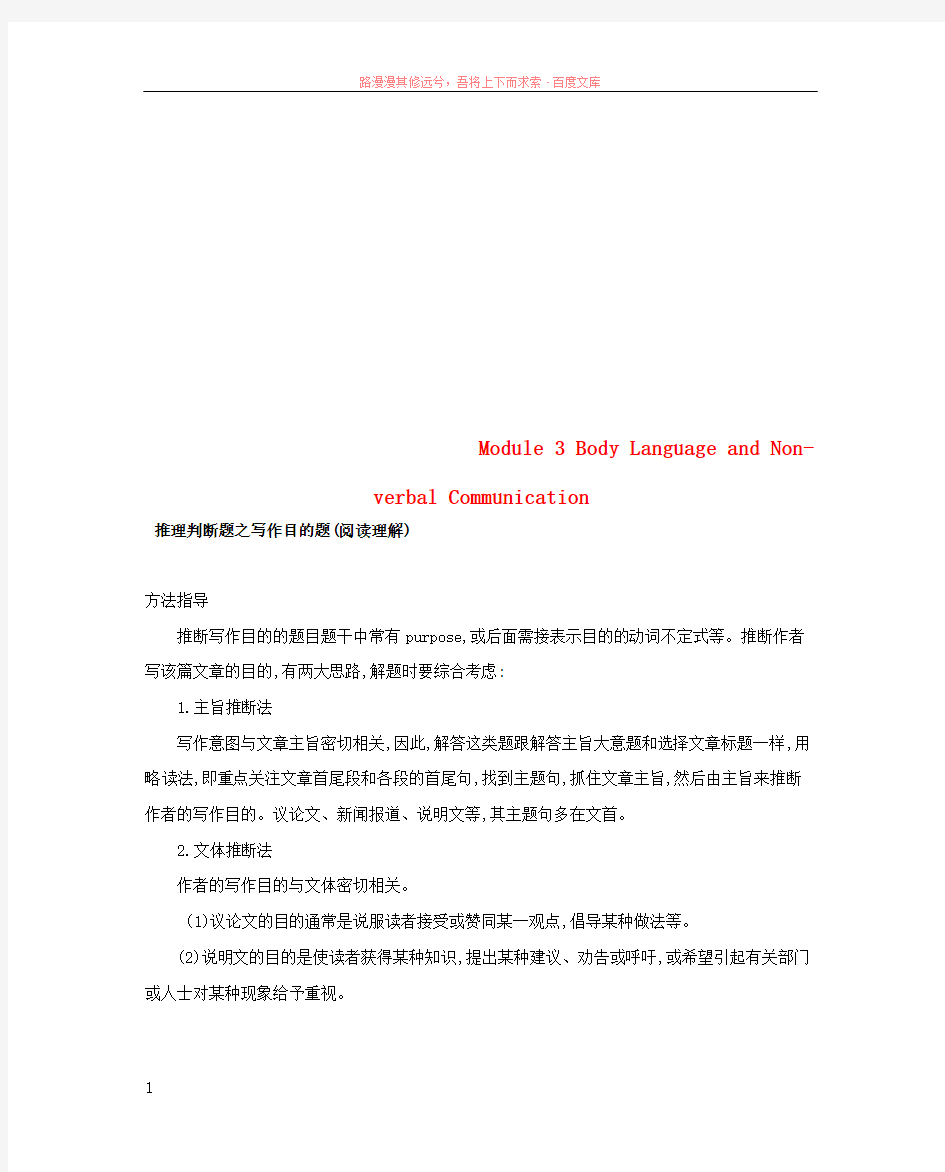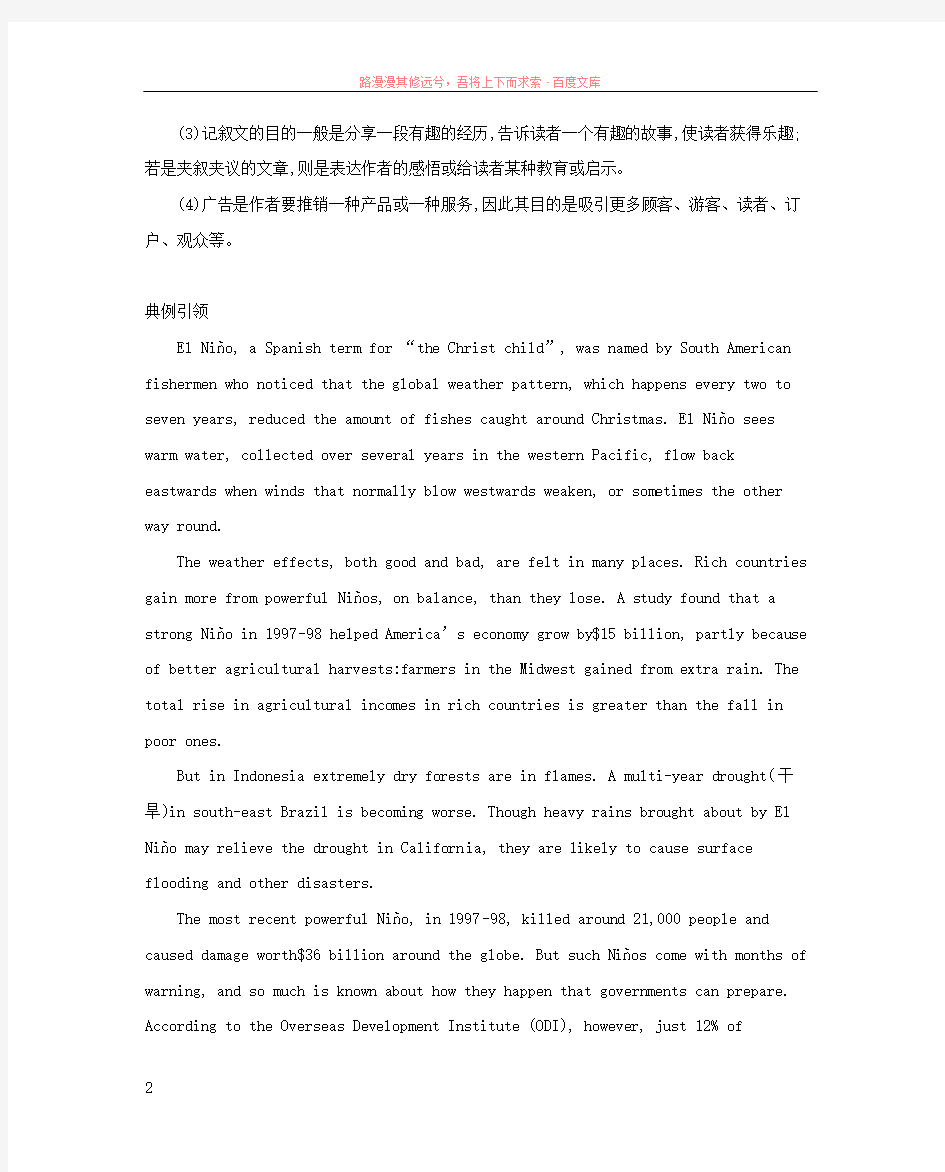

Module 3 Body Language and Non-
verbal Communication
推理判断题之写作目的题(阅读理解)
方法指导
推断写作目的的题目题干中常有purpose,或后面需接表示目的的动词不定式等。推断作者写该篇文章的目的,有两大思路,解题时要综合考虑:
1.主旨推断法
写作意图与文章主旨密切相关,因此,解答这类题跟解答主旨大意题和选择文章标题一样,用略读法,即重点关注文章首尾段和各段的首尾句,找到主题句,抓住文章主旨,然后由主旨来推断作者的写作目的。议论文、新闻报道、说明文等,其主题句多在文首。
2.文体推断法
作者的写作目的与文体密切相关。
(1)议论文的目的通常是说服读者接受或赞同某一观点,倡导某种做法等。
(2)说明文的目的是使读者获得某种知识,提出某种建议、劝告或呼吁,或希望引起有关部门或人士对某种现象给予重视。
(3)记叙文的目的一般是分享一段有趣的经历,告诉读者一个有趣的故事,使读者获得乐趣;若是夹叙夹议的文章,则是表达作者的感悟或给读者某种教育或启示。
(4)广告是作者要推销一种产品或一种服务,因此其目的是吸引更多顾客、游客、读者、订户、观众等。
典例引领
El Ni?o, a Spanish term for “the Christ child”, was named by South American fishermen who noticed that the global weather pattern, which happens every two to seven years, reduced the amount of fishes caught around Christmas. El Ni?o sees warm water, collected over several years in the western Pacific, flow back eastwards when winds that normally blow westwards weaken, or sometimes the other way round.
The weather effects, both good and bad, are felt in many places. Rich countries gain more from powerful Ni?os, on balance, than they lose. A study found that a strong Ni?o in 1997-98 helped America’s economy grow by$15 billion, partly because of better agricultural harvests:farmers in the Midwest gained from extra rain. The total rise in agricultural incomes in rich countries is greater than the fall in poor ones.
But in Indonesia extremely dry forests are in flames. A multi-year drought(干旱)in south-east Brazil is becoming worse. Though heavy rains brought about by El Ni?o may relieve the drought in Californ ia, they are likely to cause surface flooding and other disasters.
The most recent powerful Ni?o, in 1997-98, killed around 21,000 people and caused damage worth$36 billion around the globe. But such Ni?os come with months of warning, and so much is known about how they happen that governments can prepare. According to the Overseas Development Institute (ODI), however, just 12% of
disaster-relief funding in the past two decades has gone on reducing risks in advance, rather than recovery and rebuilding afterwards. This is despite evidence that a dollar spent on risk-reduction saves at least two on reconstruction.
Simple improvements to infrastructure(基础设施)can reduce the spread of disease. Better sewers(下水道)make it less likely that heavy rain is followed by an outbreak of the disease of bad stomach. Stronger bridges mean villages are less likely to be left without food and medicine after floods. According to a paper in 2011 by Mr Hsiang and co-authors, civil conflict is related to El Ni?o’s harmful effects—and the poorer the country, the stronger the link. Though the relationship may not be causal, helping divided communities to prepare for disasters would at least reduce the risk that those disasters are followed by killing and wounding people. Since
the poorest are least likely to make up for their losses from disasters linked to
El Ni?o, reducing their losses needs to be the priority.
1.What can we learn about El Ni?o in Paragraph 1?
A.It is named after a South American fisherman.
B.It takes place almost every year all over the world.
C.It forces fishermen to stop catching fish around Christmas.
D.It sees the changes of water flow direction in the ocean.
2.What may El Ni?os bring about to the countries affected?
A.Agricultural harvests in rich countries fall.
B.Droughts become more harmful than floods.
C.Rich countries’ gains are greater than their losses.
D.Poor countries suffer less from droughts economically.
3.The data provided by ODI in Paragraph 4 suggest that .
A.more investment should go to risk reduction
https://www.doczj.com/doc/846740377.html,ernments of poor countries need more aid
C.victims of El Ni?o deserve more compensation
D.recovery and reconstruction should come first
4.What is the author’s purpose in writing the passage?
A.To introduce El Ni?o and its origin.
B.To explain the consequences of El Ni?o.
C.To show ways of fighting against El Ni?o.
D.To urge people to prepare for El Ni?o.
方法运用 [语篇解读] 本文是一篇说明文,主要介绍了厄尔尼诺现象名称的由来、发生的时间、造成的影响,督促人们加强风险前资金的投入,改进基础设施,为厄尔尼诺现象的发生做好准备。
1.D 事实细节题。根据文章第一段的El Ni?o sees warm water, collected over several years in the western Pacific, flow back eastwards when winds that normally blow westwards weaken, or sometimes the other way round.可知厄尔尼诺现象见证了大海中水流方向的变化。故选D。
2.C 事实细节题。根据文章第二段的Rich countries gain more from powerful Ni?os, on balance, than they lose.可知总的来说富裕国家收获的比失去的多,故C项正确。
3.A 推理判断题。根据文章第四段第三句According to the Overseas Development
Institute (ODI), however, just 12% of disaster-relief funding in the past two decades has gone on reducing risks in advance...可知在过去二十年里仅有12%的灾难救济资金用于提前降低风险,因此第四段旨在说明应该投入更多的资金来降低风险。
4.D 主旨大意题。综合全文内容并结合文章最后一段可知本文旨在督促人们为厄尔尼诺现象做好准备。